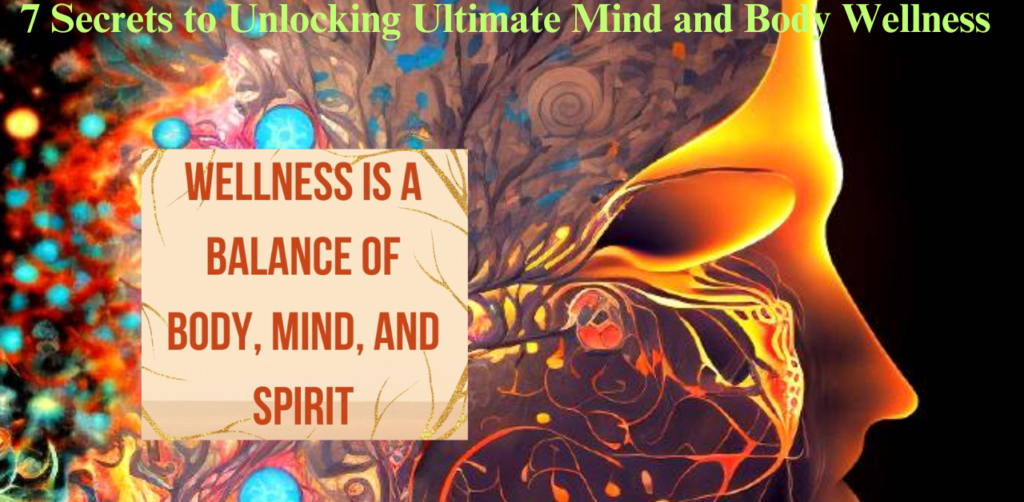
- 7 Secrets to Unlocking Ultimate Mind and Body Wellness
- Simple Practices for Mind and Body Wellness
- Managing Stress for Better Wellness
- Conclusion: Your Path to Holistic Wellness
- Also read This : International Mind and Body Wellness Day 2025: Simple Practices for Holistic Health
7 Secrets to Unlocking Ultimate Mind and Body Wellness
Mind and Body Wellness: Achieving Balance for a Healthier Life
In today’s fast-paced world, finding the right balance between mental and physical health is essential for overall well-being. The concept of mind and body wellness is all about achieving harmony between our mental and physical states, ensuring that both aspects work together for a healthier, happier life. By focusing on both, we can improve our emotional resilience, enhance our quality of life, and foster long-term health.
The Powerful Connection Between Mind and Body
Your mind and body are deeply interconnected. Mental stress, anxiety, and negative emotions can affect your physical health, leading to headaches, digestive issues, or even more serious conditions. On the flip side, physical ailments such as chronic pain or illness can create emotional strain. Understanding the powerful connection between the two is key to maintaining overall wellness.
By addressing both mental and physical health, we can create a foundation for lasting health and happiness. This holistic approach encourages us to take care of our body while nurturing our mind, ensuring we are truly thriving.
Simple Practices for Mind and Body Wellness
1. Regular Exercise for a Strong Body and Mind
Exercise is one of the most effective ways to improve your physical health while also benefiting your mind. Regular physical activity strengthens muscles, supports heart health, and boosts immunity. More importantly, exercise releases endorphins, the body’s natural stress relievers that help combat anxiety and depression.
Whether you enjoy yoga, walking, jogging, or swimming, getting active not only improves your fitness but also helps clear your mind, making it a key aspect of mind-body wellness.
2. Mindfulness and Meditation: Essential for Mental Clarity
Mindfulness and meditation are two powerful practices that focus on mental health. By engaging in regular mindfulness practices, you can develop better awareness of your thoughts and emotions, helping you manage stress, anxiety, and negative feelings. Meditation, in particular, is known for its ability to calm the mind, reduce stress hormones, and improve emotional well-being.
Taking a few minutes daily to practice mindfulness or meditation can have profound effects on mental clarity, focus, and relaxation. It’s a simple, yet highly effective tool for mental wellness.
3. Nourishing Your Body: Eating for Both Mind and Health
What you eat plays a major role in how you feel—both physically and mentally. A balanced diet that includes nutrients like omega-3 fatty acids, antioxidants, and vitamins supports brain health and mental well-being.
Incorporating whole foods like fruits, vegetables, lean proteins, and whole grains into your diet not only boosts your energy but also helps improve your mood and cognitive function. Avoiding excess sugar and processed foods is equally important, as they can cause mood swings and energy crashes.
4. Quality Sleep: The Foundation of Health
Getting enough sleep is crucial for maintaining both mental and physical health. When you sleep, your body repairs itself, and your mind processes emotions and memories. Lack of sleep can lead to stress, irritability, and a weakened immune system, making it harder to handle daily challenges.
To improve sleep quality, stick to a consistent sleep schedule, create a relaxing bedtime routine, and keep your bedroom environment calm and comfortable.
5. Social Connections: Emotional Well-being Matters
Having strong social connections is vital for emotional health. Whether it’s spending time with family, friends, or colleagues, positive relationships provide support, reduce stress, and enhance emotional resilience. Being part of a community or a support group helps combat loneliness and creates a sense of belonging.
Engaging in social activities or even seeking professional counseling when necessary can significantly boost your emotional well-being and contribute to overall wellness.

Managing Stress for Better Wellness
Stress is an inevitable part of life, but managing it effectively is crucial for maintaining mind and body wellness. Chronic stress can lead to physical health problems, like heart disease, and contribute to mental health issues, such as anxiety and depression. Learning to manage stress through relaxation techniques, deep breathing exercises, and time management can help you stay balanced.
Taking regular breaks, practicing gratitude, and finding hobbies you enjoy are great ways to relieve stress and rejuvenate both your mind and body.
Self-Care: Prioritize Your Well-being
Self-care is an essential part of mind and body wellness. Taking time for yourself, whether it’s enjoying a hobby, reading a book, or simply resting, helps prevent burnout and emotional exhaustion. Prioritizing self-care makes it easier to handle life’s challenges, build emotional strength, and improve overall happiness.
Conclusion: Your Path to Holistic Wellness
Mind and body wellness is a continuous journey of self-care and growth. By focusing on both physical and mental health, you create a strong foundation for overall well-being. Regular exercise, mindful practices, proper nutrition, good sleep, social connections, and effective stress management are all essential components of this holistic approach.
Incorporating these habits into your daily routine can improve your resilience, boost your energy, and enhance your overall quality of life. Mind and body wellness is all about finding balance and living in harmony with yourself, enabling you to thrive in every aspect of life. With small, consistent efforts, you can experience lasting health and happiness.





